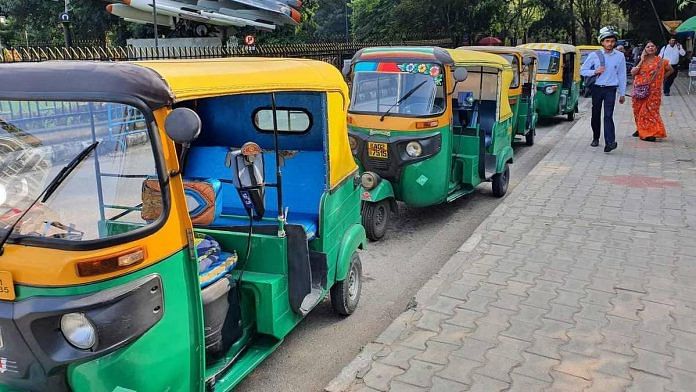Bengaluru: Banning bike taxis and regulating the practice of “blacklisting” auto rickshaw and cab drivers with complaints against them from apps are some of the “non-negotiable” demands made by private transport service providers, further fuelling the dissonance between traditional services and disruptive tech solutions in India’s IT capital.
At least 12 major unions of auto rickshaws, cabs and private buses, among others, have come together and made around 30 demands to the Siddaramaiah-led Congress government in Karnataka.
“There is no provision for bike-taxis in Bengaluru but because there are no formal guidelines or laws (against it either), several companies are offering these services. Our business is getting impacted as a result,” Raghu Narayana Gowda, the president of the Peace Auto & cab drivers association told ThePrint.
A state-wide strike, scheduled to be held Wednesday was called off even though the group continued to mobilise support for their cause and have not ruled out a strike if their demands are not met.
“Our livelihoods have been badly impacted. First it was these cab companies, now it is bike taxis and the free bus service for women. How do we survive,” asked Manjunath, president of Adarsha Auto & Taxi Drivers’ Union.
Auto rickshaw drivers are now crying foul against the government for “allowing” bike taxis in the city, which, they say, are snatching away their livelihood as more options for mobility eat into their business.
Bike taxis are technically not legal in Bengaluru, as several proposals are pending before the government for the formulation of guidelines on two-wheeler services. But in the absence of clear rules, some tech companies have started offering bike taxi services to customers.
Though the state government has not formulated any guidelines for bike taxis, its EV (electric vehicle) policy in 2021 has added to the confusion. On 14 July, 2021, then chief minister B.S. Yediyurappa had issued a formal notification on the ‘Karnataka Electric Bike Taxi Scheme, 2021′ and even provided a set of guidelines outlining the regulations for the vertical.
The notification stated that such EV bike taxis, that have been allowed in other states, will help Karnataka as “many urban centres…are grappling with the issue of traffic jam and problem of first and last mile connectivity”.
However, this was challenged in court and remains there, allowing some operators to continue the service.
Priyank Kharge, Karnataka’s minister for information technology and biotechnology, admitted that laws have rarely kept up with the state and central governments’ bid to pursue multi-modal mobility solutions for large cities across the country.
“Our policies are still playing catch-up to technology. There is a ban on bike taxis. There is no concept of car-sharing or car-pooling in the Motor Vehicles Act, and if you go by the Indian Telegraph Act, you’re not even allowed to lay an optical-fibre cable,” Kharge told ThePrint last week.
While lawmakers deliberate on policy guidelines, the dissonance between established practices and new technologies manifests in a very different manner on ground.
On 18 July, a group of auto drivers allegedly accosted and attacked a group of persons from app-based aggregator Rapido while the latter was distributing rain curtains and seat belts for the auto drivers of their company.
In June, the Bike Taxi Association of Bengaluru wrote to the city police commissioner, seeking protection from attacks on its members after auto drivers allegedly assaulted a Rapido bike taxi service provider near Jalahalli metro station.
The Print reached out to Aravind Sanka, co-founder of Rapido via telephone and email, and Uber’s spokesperson via calls. This article will be updated if a response is received.
“We are asking the government to frame guidelines for us, too, to operate autos and cabs. There are nearly 1 lakh bike taxi riders in the state,” Adi Narayana, the president of the Bike Taxi association, told ThePrint.
Also Read: Uber’s auto woes in Bengaluru show how archaic systems are obstacle to city’s tech-hub aspirations
‘Tech DNA’
Karnataka has over 20,000 technology-based start-ups, according to the state government.
One of these is ‘Namma Yatri’ (Our Traveller), an app-based service that Bengaluru auto drivers, disillusioned by the “high commission charges” of companies like Uber and Ola, launched last year.
The app was developed by a Bengaluru-based company with support from the Nandan Nilekani-led non-profit Foundation for Interoperability in Digital Economy (FIDE, formerly Beckn Foundation), which provides an open-source protocol to “build digital infrastructure as a public good”.
Companies like Ola, Flipkart, Amazon and several others call Bengaluru their home but each one of these has had its share of troubles with the state government over the years.
As media reports show, in October last year, the Karnataka government declared auto services offered by app-based aggregators such as Ola, Uber and Rapido “illegal” after the transport department acted on complaints of minimum fare violations.
In 2014, tax authorities in Karnataka stopped Amazon from selling electronics and other products in the state.
In October 2021, the Basavaraj Bommai-led Bharatiya Janata Party (BJP) government in the state banned online gaming. However, that law was later struck down by the Karnataka High Court.
“Karnataka has been a leader in setting up tech-enabling policies but not all aspects of these policies are in the domain of the state. They have to be harmonised with central interventions over time,” Prashanth Prakash, a founding partner at VC firm Accel and the chairman of Karnataka’s vision group on start-ups, told ThePrint Sunday.
(Edited by Nida Fatima Siddiqui)
Also Read: Karnataka’s online gaming ban won’t work. It shows poor grasp of tech



